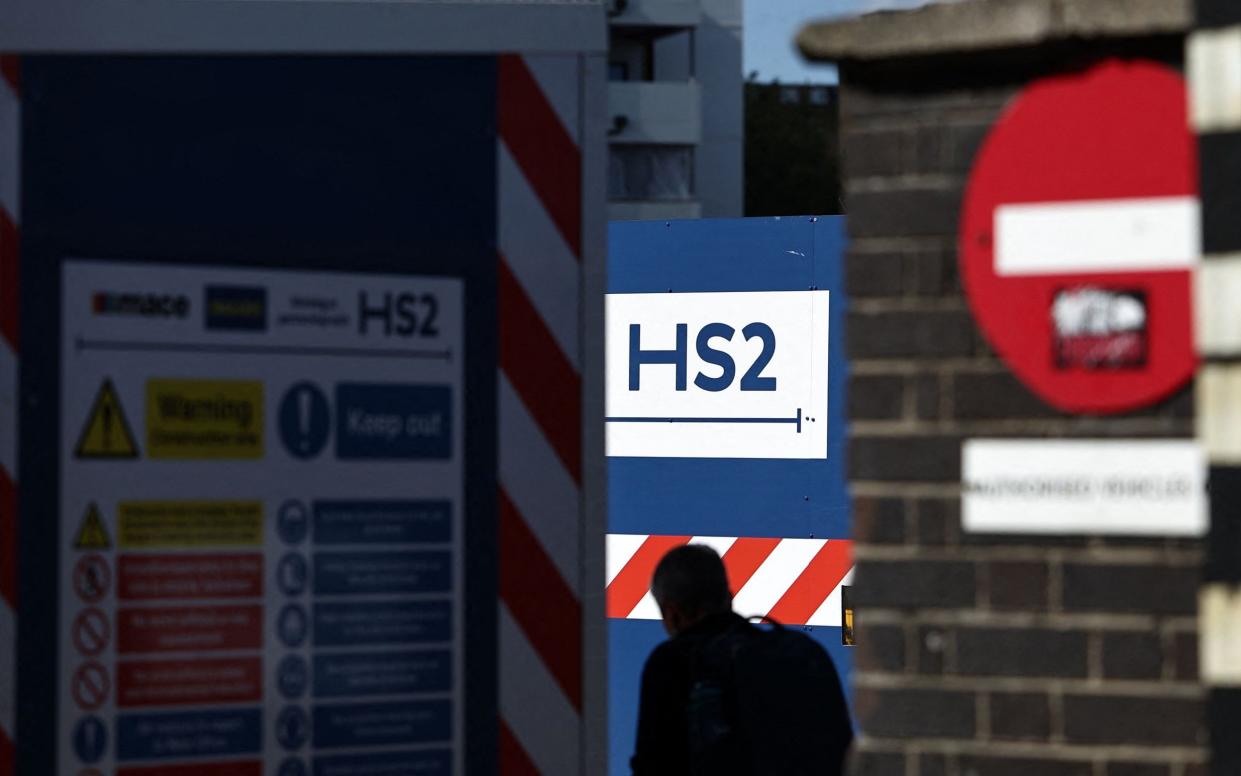Letters: The exorbitant and unwanted HS2 project has become a symbol of government by Blob

SIR – The HS2 project is a perfect example of government by Blob. It took more than three years to advance from parliamentary Bill to Royal Assent in 2017, but six years later only a small part has been built. The target completion date of the project that nobody asked for is unknown. The southern end has yet to reach London and the bits to Scotland and even Manchester remain in the planning ether. And don’t mention the cost.
In the meantime, the Establishment slogans still abound: 30,000 jobs, levelling up – and, of course, 20 minutes off the journey time from Birmingham to London.
To call this a waste of money would be the understatement of the year.
John Pritchard
Ingatestone, Essex
SIR – There has been resistance to the idea of scrapping the northern leg of HS2, but this project was always impractical for residents of north Cheshire – even though it has already devoured large swathes of our county.
What we need is a decent ordinary train service into Manchester. There are large numbers of cancellations on our 40-year-old trains, and a big investment is required to sort it out. Give us some HS2 money to do it.
Richard S Cussons
Knutsford, Cheshire
SIR – Every time I drive past the massive HS2 works taking place around Wendover, what do I see? For every two workers doing a task there are another two standing around doing nothing. Scale this up and it’s not difficult to understand why this project is so far over budget. Where is the supervision of the workforce?
Richard Hall
Great Missenden, Buckinghamshire
SIR – As I live in East Anglia, HS2 will have zero impact on me. And initially I was against spending such vast sums of money on a vanity project. But as it is partially built, it would be ludicrous to abandon it now. It must be completed if we are not to become the laughing stock of Europe.
Susan Cunliffe
Woodbridge, Suffolk
Braverman’s priorities
SIR – I have sympathy with the thrust of Suella Braverman’s speech regarding immigration, asylum status and the UN Refugee Convention (“Home Secretary warns 780m people could claim asylum without reform of global refugee rules”, report, September 26).
However, she belittles her argument with her focus on illegal immigration. While 108,000 people may have crossed the Channel illegally since 2018, data readily available from the Office for National Statistics record much higher numbers of non-UK individuals migrating into the UK in the same period.
Perhaps she should focus on the bigger picture rather than populism.
Ian Fitter
Helston, Cornwall
The EU market
SIR – Is Daniel Hannan right that it is now too late for Britain to pursue EU market-only membership (Comment, September 24)?
He refers to Lord David Owen – one of the most experienced statesmen we possess, and uniquely knowledgeable about the EU. Sadly Lord Owen was consistently ignored by the naive arrivistes who occupied government after his time.
Not only had he mapped out a perfectly balanced and achievable strategy towards the EU in his previous work, but he also, in December 2018, on the eve of the final vote on the Withdrawal Agreement, wrote an open letter of guidance to Theresa May and all MPs. In it he laid out in detail how to deal with the situation should the third vote fail, which it did.
He offered a simple and achievable plan to remain a trading partner within the European Economic Area while removing the constitutional encumbrances of the EU federalist legislative and cultural agendas. How one wishes that MPs had acted on his suggestions. We would have been spared the fractious and destructive atmosphere that now prevails.
I stood as a Brexit Party candidate in the 2019 general election and endorse Lord Hannan’s opinion that Mrs May and many within the political and media classes misread what a large proportion of Brexit voters wanted: to free ourselves from the rule of an undemocratic foreign legislature, one inimical to the customs and interests of the British people.
The common market, complete with its standardised regulations, could have been tolerated for its economic benefits but would be sacrificed, if need be, in favour of regaining the sovereignty of our Parliament and courts. That is what transpired. Had those in power listened to Lord Owen at any time in the 20 years running up to the referendum, perhaps we would be in a better place now.
I think current politicians still misread the voters. If they had the courage to put bold proposals to the electorate now, perhaps we could still reach something like a Canada +++ situation and win the approval of the people. But do we have those bold and courageous leaders?
Robert Ross
Warminster, Wiltshire
SIR – Mark Peaker (Letters, September 24) puts most of our economic woes down to Brexit.
I am not an economist but, if he is correct, what explains the similar problems that Germany, France and Italy are experiencing? I wonder if their populations blame the EU.
Dr David Walters
Burton Bradstock, Dorset
SIR – Matthew Lynn (Business comment, September 24) suggests that, against a backdrop of intense international competition and lower capital markets activity, there is a level of complacency at the London Stock Exchange. He writes that we are not “urgently looking at ways of making the market more dynamic, of opening it up to more new businesses, and at drawing in fresh investment”. In the starkest possible terms, he could not be more wrong.
The London Stock Exchange is working intensely every day to advance and enhance the UK capital markets. We are in constant dialogue with government and regulators to make the UK market more competitive and are vocal advocates for reform.
LSE is at the heart of an ecosystem – a living, breathing system of companies, investors, research analysts, rules, norms and behaviours that all contribute to the UK economy and determine the UK’s place as a global financial centre. And because of this, we have not just asked ourselves: how can we make LSE a more attractive place to list? We have asked a bigger question: how can we ensure that the whole UK capital markets ecosystem works as well as it can, so we have the best possible environment for companies to start, to scale, to thrive and to stay?
The work we are doing in pursuit of this aim is urgent, it is broad and it is far-reaching. It is work we do both as the London Stock Exchange and as a founding member of the Capital Markets Industry Taskforce to affect the kind of change that Mr Lynn rightly wants to see.
Julia Hoggett
Chief executive officer
London Stock Exchange
Internet speeds
SIR – It was amazing to read about Nasa’s Osiris-Rex capsule, which made a four billion-mile journey in seven years to collect samples from the killer asteroid Bennu (report, September 25). Communication with the capsule was paramount in this extraordinary endeavour.
Yet we in Lincolnshire and other parts of rural England have to live with internet speeds of two Mbps. To illustrate how poor this is, the minimum required speed for streaming Netflix is three Mbps. In London one can get up to three Gbps.Perhaps we should ask Nasa to help us improve connectivity in rural England.
Ramesh Nayak
Louth, Lincolnshire
Nutrient neutrality
SIR – Your report (“Sunak will rip up green rules to build 140,000 new homes”, September 24) alleges that Natural England, the Government’s adviser for the natural environment, is on “a collision course” with the Prime Minister over the Government’s planned approach to nutrient neutrality rules.
Let me be clear: Natural England’s job is to recover nature. Meeting the Government’s legal targets on the environment will be challenging and needs concerted action across every part of society. Equally, we recognise the need for sustainable development to provide the homes and services we require.
That is why, as the country’s expert nature recovery body, Natural England provides legally based and scientific advice to councils and developers so they can design and build sustainable communities without harming nature.
For the past year, we have worked with the Government and councils on a mitigation scheme that helps developers offset the damage caused by waste water from new houses by purchasing credits from environmental improvement projects such as wetlands. This scheme, which is backed by £30 million of cross-government funding and remains open, will enable the construction of at least 40,000 houses, all while protecting our rivers.
So rather than being on “a collision course” with the Prime Minister, we will continue to work closely with the Government as it considers next steps.
Marian Spain
Chief executive, Natural England
London SW1
Evensong at home
SIR – Richard Selley (Letters, September 24) hopes that broadcasters will continue to transmit religious programmes such as Songs of Praise.
He could also have mentioned Choral Evensong, broadcast on Sunday afternoon on BBC Radio 3 and repeated on Wednesday afternoon. This is a fine example of a unique British tradition: wonderful music both ancient and modern, beautiful readings from the Bible, comforting prayers and a great, rousing final organ voluntary.
Sadly, few now attend Evensong, but at least they can relax in their armchairs and listen on the radio.
Duncan Rayner
Sunningdale, Berkshire
Endangered animals that owe their lives to zoos

SIR – I read with interest Freya Aspinall’s call for all zoos to be closed down (report, September 24).
Has she considered the views of eminent naturalists such as Sir David Attenborough and Gerald Durrell, who have so eloquently highlighted zoos’ pivotal role in conservation, education and research?
I don’t doubt that Ms Aspinall means well, but perhaps she should try explaining her views to the Partula snail or golden lion tamarin – both animals that owe their very existence to captive breeding programmes.
Seyan Dattani
Fellow, Zoological Society of London
Northwood, Middlesex
Welsh wine
SIR – In your Leading Article (September 24) you say that “English wine is experiencing a boom”. Quite right. But so is Welsh wine.
Over the bridge, we too have experienced a hot, dry start and end to the growing season, sandwiching warm wet weather in between, leading to high yield and excellent quality.
Welsh wine production is growing – and winning the highest accolades in international competitions, including the Global Wine Masters, Decanter and the International Wine Challenge.
Andy Mounsey
Chair, Welsh Vineyards Association
Lampeter Velfrey, Pembrokeshire
Parachutist’s progress
SIR – In 1955 I was stationed in Aldershot doing my pre-parachute training.
We were told that those of us who passed and went to Abingdon for actual parachute training in order to gain our wings would not believe the difference between Army catering and that of the RAF (Letters, September 24).
They were more than correct. The amount and quality of the food was astonishing.
The thing that sticks in my mind to this day is how you could help yourself to the different types of cordial. And there was butter on the tables.
Liddle Stokoe
Ashtead, Surrey
Letters to the Editor
We accept letters by email and post. Please include name, address, work and home telephone numbers.
ADDRESS: 111 Buckingham Palace Road, London, SW1W 0DT
EMAIL: dtletters@telegraph.co.uk
FOLLOW: Telegraph Letters on Twitter @LettersDesk
NEWSLETTER: sign up to receive the award-winning Telegraph Conversations here

